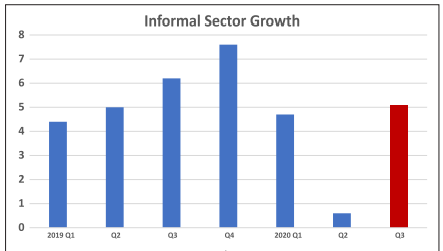- Economist call for more public investment into the sector
Despite the coronavirus pandemic’s impact hammering various sectors of the economy and sending it into a recession as it has recorded contraction in two straight quarters, the informal sector came out stronger, recording impressive growth, thereby, making a case for the formalisation of the sector.
Latest data released by Ghana Statistical Service on the country’s GDP shows the informal sector, in the third quarter grew by 5.1 percent, a significant jump from the 0.6 percent recorded in the second quarter of 2020. This, somewhat confirms that the lockdown measures imposed to contain the spread of the virus in the second quarter really impacted negatively on the informal sector.
And in the same vein, interventions made by government to cushion the sector after the lockdown was lifted may have also paid off, giving the sector its impressive performance in the third quarter.
One intervention that was introduced is the Coronavirus Alleviation Programme Business Support Scheme (CAP BuSS) aimed at cushioning the micro, small and medium enterprises (MSMEs) from the impact of the coronavirus (COVID-19) pandemic. The CAP BuSS was established with a seed capital of GH¢600 million and subsequently topping it up with GH¢150 million.

Through the CAP BuSS, which was implemented by the National Board for Small-Scale Industries (NBSSI), more than 200,000 Micro, Small and Medium Enterprises (MSMEs) have received some form of financial and or capacity building support from the programme
Making a case of formalisation
Economist with Databank Research, Courage Martey, in an interview with the B&FT, agreed that the intervention by government played a major role in the informal sector’s performance, hence, more such attention is needed to increase its contribution to the economy.
“The focus of the interventions given by government went to the informal sector and that shows how quality interventions can impact growth in any area. It tells you what benefit we can gain if we make efforts to formalise the informal sector and also make effort to review the perceived credit risk in the area so that banks will fund the sector for it to expand.
So the growth that we saw in the informal sector despite the overall contraction is an indication of what more we can benefit if we formalise the sector; implement policies that will reduce the risk in the sector; and banks also lend to the sector.
If the sector were to be robust and bigger than it is now, the economy may not have contracted. So we need a lot more of public investments in the sector for it to contribute more to the economy. Imagine what cushion it would have provided the economy if the sector was bigger than this,” he said.
Formalising the informal sector has been a constant message on the lips of all analysts who have proffered solutions to government on ways of increasing tax revenue.
A research by the Private Enterprise Federation has revealed that Micro, Small and Medium Enterprises (MSMEs) in the country contribute a paltry 4 percent to domestic tax revenue despite making up about 92 percent of registered businesses, often due to complexities in the tax administration system. A more formalised sector will therefore improve government’s domestic revenue mobilsation efforts.










